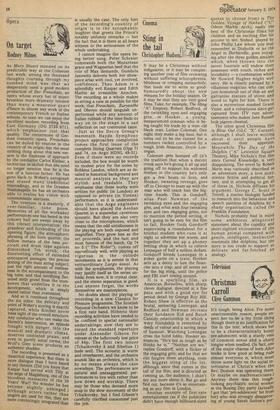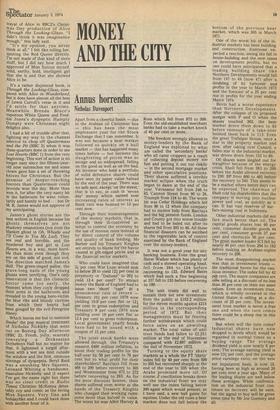Television
Christmas Carroll
Clive Gammon
It's tough, being Alice. For some unaccountable reason, people expect her to be a fey little thing though there is no justification for this in the text, which shows her to be a characteristically bossy pre-adolescent with a sturdy vein of common sense and a sharp tongue when needled. (In fact, one of the major charms of both Alice books is how good at being rude almost everyone is, which must throw some light on the social intercourse at Christ's when the Rev. Dodson was operating there. Or maybe on mathematicians.) Anyway there was this tough looking psychiatric social worker at the Boxing Day party (actuallY I got that 'pre-adolescent' bit from her) who was strongly disapproving of young Sarah Sutton's por trayal of Alice in BBC2's Christmas Day production of Alice Through the Looking-Glass. "I didn't think it was imaginative enough," this lady said.
"It's my opinion, you never think at all," I felt like telling her, quoting the Red Queen directly. I'm not made of that kind of stern stuff, but I did say how much I approved of Miss Sutton myself, solid, earthy, bold, intelligent girl that she is and that she showed Alice to be.
It's a rather disjointed book, is Through the Looking-Glass, compared with Alice in Wonderland, but it does have almost all the best of Lewis Carroll's verse in it and I'd settle for that anytime. Meanwhile Brenda Bruce's vaporous White Queen and Freddie Jones's dyspeptic Humpty Dumpty were Christmas night delights also.
I had a bit of trouble after that, fighting my way to the channel selector to chop off Quatermass and the Pit (BBC 2) when it was three-quarters done in order to see Lost Hearts (BBC 1) from the very beginning. This sort of action is no longer easy since the fifteen-yearold now outreaches me and some clown gave him a set of throwing knives for Christmas. But the Promise of deeper-reaching horrors than Quatermass could Provide won the day. More than won it, for after the very nasty bit in the bathroom he went voluntarily and hastily to bed ... but Dr M. R. James would not approve of my anticipating.
James's ghost stories are the best written in English because his ghosts themselves are not Shadowy emanations (not even the blanket ghost in Oh, Whistle and I'll Come to You My Lad). They are real and horrible, and the murdered boy and girl in Lost Hearts are, in a way, more horrible than most even though they are on the side of good, not evil. The direction matched James's skill. The green-tinged pallor, the grave-long nails of the young ghosts were terrifying. One's only reservation is that the climactic horror came too early, the moment when they coyly dropped their arms in the bathroom and revealed to the young hero-victim the blue ribs and bloody cavities from which their hearts had been gouged by the evil Peregrine Abney.
Which leaves me but to mention Smike! the pop musical treatment of Nicholas Nickleby that went out on Boxing Day afternoon (BBC 2). Fresh, jolly, scarcely conveying a Dickensian Dotheboys Hall but no matter for that, it lightened a turgid afternoon with a wet sea mist outside the window and the first, ominous stirrings of dyspepsia. Beryl Reid was a smashing Mrs Squeers, Leonard Whiting a handsome, masculine Nickleby and (I expect I've got the name right but there was no clear credit in Radio Times) Christine McKenna detestably coy and comic as the loving Miss Squeers. Very fine and holidaylike and I could have done With another hour of it.



























 Previous page
Previous page